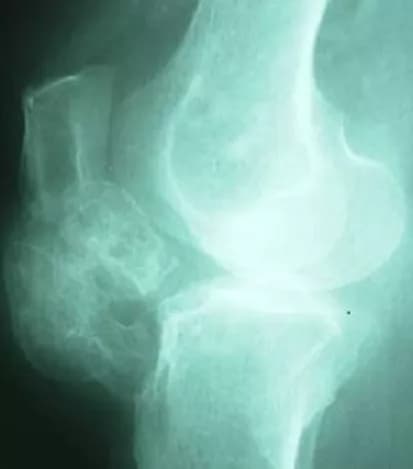What are the other Names for this Condition? (Also known as/Synonyms)
- Fat Pad Impingement Syndrome
- Hoffa’s Fat Pad Disease
- Infrapatellar Fat Pad Syndrome
What is Hoffa Disease? (Definition/Background Information)
- Hoffa Disease is a benign disorder of the synovium (a protective layer surrounding the joint space), caused as a response to injury. Hence, it is a post-traumatic reactive condition
- It is often seen around the knee joint. The disorder causes swelling below the patellar bone, which is observed in front of the knee joint. Even though commonly seen around the knee joint, other joints of the body may be affected too
- Hoffa Disease is also known as Fat Pad Impingement Syndrome, because of the impingement of the fat between the patella and the lower portion of the thigh bone
- A tissue biopsy helps in a definitive diagnosis of the condition, which is treated using both conservative methods and surgical procedures (if the signs and symptoms are severe)
- With appropriate treatment, the prognosis of Hoffa Disease is good
Who gets Hoffa Disease? (Age and Sex Distribution)
- Hoffa Disease may occur in individuals of all ages, races, ethnic groups, and gender
- However, it is more common in men than women
- Generally, men who are physically active, have a high incident rate
What are the Risk Factors of Hoffa Disease? (Predisposing Factors)
Some of the risk factors associated with Hoffa Disease include:
- Repeated physical activity involving sudden bending or straightening of the knee joint
- Sports activity that cause repeated stress to the knee, such as football, beach volleyball, gymnastics, soccer
- Certain occupations that require prolonged kneeling, also increases the risk
It is important to note that having a risk factor does not mean that one will get the condition. A risk factor increases ones chances of getting a condition compared to an individual without the risk factors. Some risk factors are more important than others.
Also, not having a risk factor does not mean that an individual will not get the condition. It is always important to discuss the effect of risk factors with your healthcare provider.
What are the Causes of Hoffa Disease? (Etiology)
- An acute injury or chronic repetitive stress can cause Hoffa Disease
- Hoffa Disease (Infrapatellar Fat Pad Syndrome) occurs because of an impingement or pinching of fat tissue between the kneecap (patella) and the lower portion (distal end) of the thigh bone, called femoral condyle
What are the Signs and Symptoms of Hoffa Disease?
The signs and symptoms of Hoffa Disease include:
- Restricted range of motion in the affected joints
- It usually causes pain that increases with physical activity (like exercise), or while stretching/straightening one’s knee
- Frequently, Hoffa Disease affects the knee joint; although, other joints may also be affected
- The condition can cause an accumulation of joint fluid, called a reactive joint effusion, due to repeated injury of the synovial layer that surrounds a joint
How is Hoffa Disease Diagnosed?
A diagnosis of Hoffa Disease may involve:
- A physical examination and evaluation of complete medical history by a healthcare provider
- X-ray of the affected joint
- MRI scan of the affected joint
- A tissue biopsy, where the tissue is examined by a pathologist under the microscope, to arrive at a definitive diagnosis
Many clinical conditions may have similar signs and symptoms. Your healthcare provider may perform additional tests to rule out other clinical conditions to arrive at a definitive diagnosis.
What are the possible Complications of Hoffa Disease?
The possible complications from Hoffa Disease include:
- If treatment is lacking or is not provided in a timely manner, then the condition can progress to cause damage to the affected joint
- Pain can be severe and decrease the quality of one’s life
How is Hoffa Disease Treated?
Conservative methods of treatment of Hoffa Disease are employed initially and these may include:
- Rest and reduction in physical activity is the first choice
- Ice pack can reduce inflammation
- Physical therapy
- Use of well-fitting shoes to reduce stress on the knee joint
- Over-the-counter pain medication may be used to reduce inflammation
- Steroid injection to the site of swelling
If the condition is recurrent causing significant pain and swelling, then surgery is recommended.
- A surgery involves the removal of extrasynovial fat tissue, which occurs as a reaction to a repeated injury
- Surgery to treat Hoffa Disease is performed using arthroscopy, a minimally-invasive procedure
How can Hoffa Disease be Prevented?
A few preventive measures for Hoffa Disease include:
- Perform appropriate warming-up or stretching exercises, before taking part in a physical activity
- Participants of intense physical and sports activities have to be physically fit, and ensure that they maintain their stamina and strength
- Use of suitable protective gear around the knee joint, like knee padding
- If a diagnosis of Hoffa Disease is made, then a reduced (or a complete cessation of) physical activity can help decrease progression of the condition
- If there is repeated pain around the affected joint, do visit your physician immediately
What is the Prognosis of Hoffa Disease? (Outcomes/Resolutions)
- The prognosis of Hoffa Disease is generally very good with surgical treatment, in advance cases
- In case of a knee joint injury, a complete recovery is encouraged, before returning to any intense physical activities
- A lack of treatment or delayed treatment may cause additional complications, such as prolonged pain and joint damage
Additional and Relevant Useful Information for Hoffa Disease:
The following article link will help you understand arthroscopic surgical procedure.
http://www.dovemed.com/common-procedures/procedures-surgical/arthroscopy/
Related Articles
Test Your Knowledge
Asked by users
Related Centers
Related Specialties
Related Physicians
Related Procedures
Related Resources
Join DoveHubs
and connect with fellow professionals


0 Comments
Please log in to post a comment.